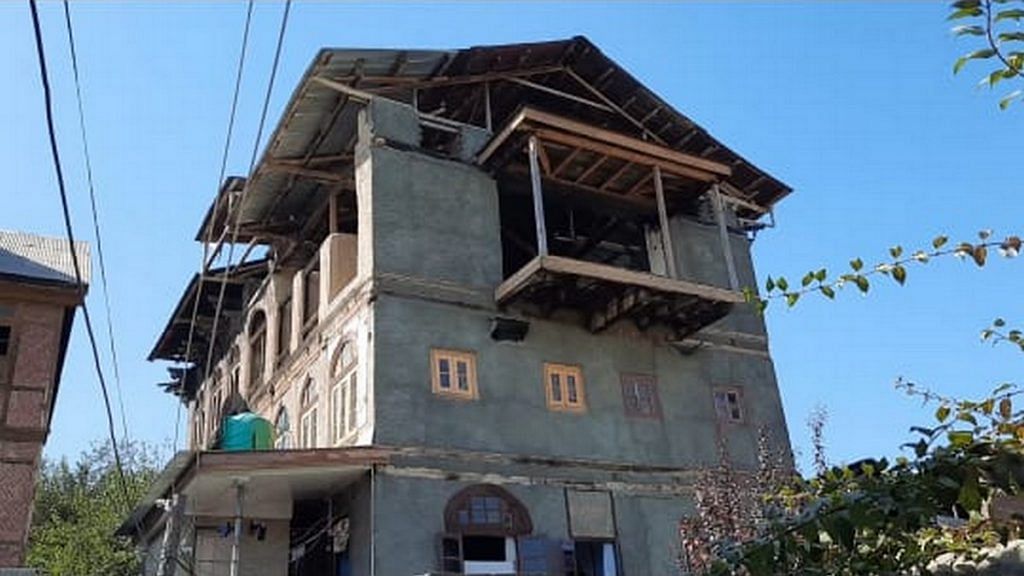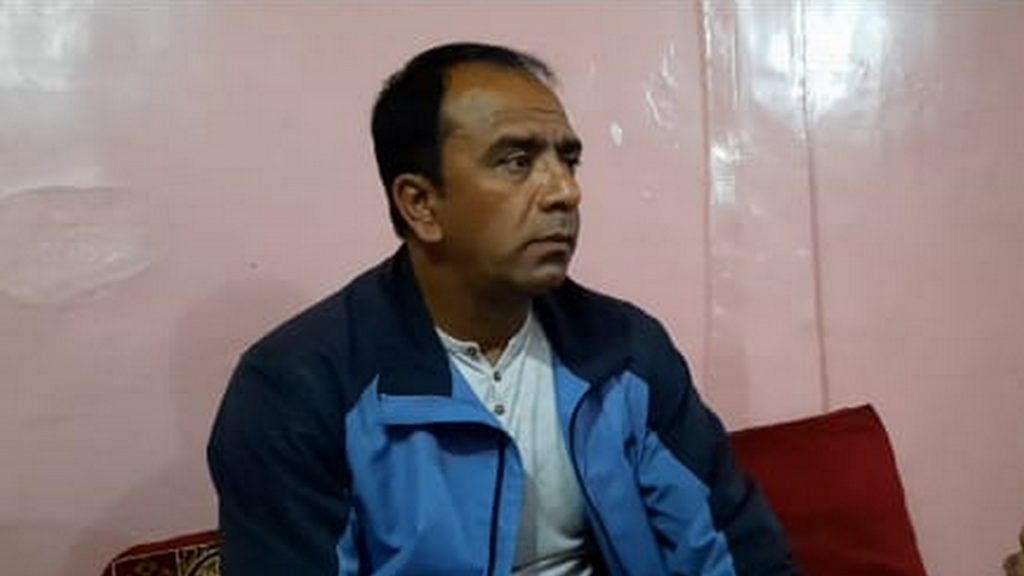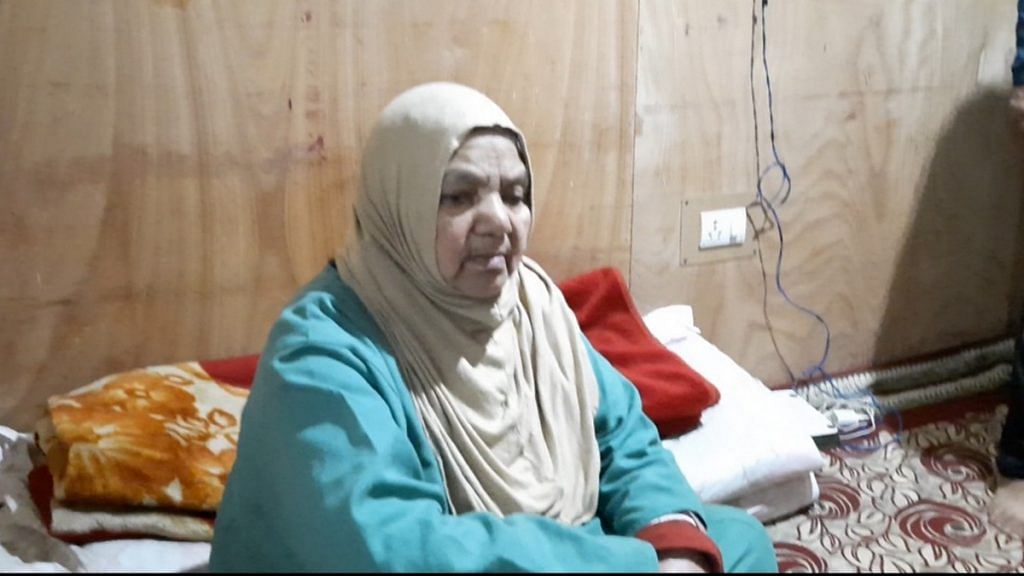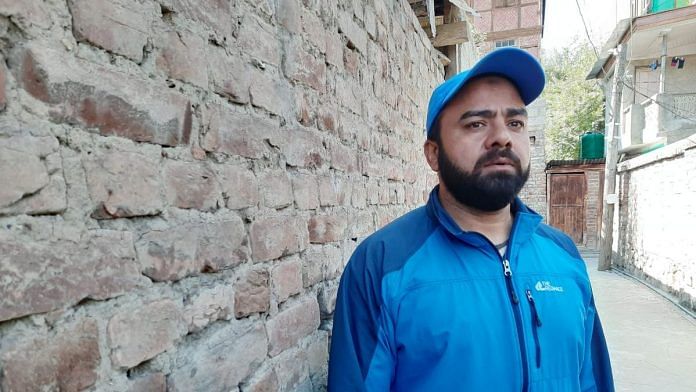Srinagar: Each time a relative or neighbour walks into the Mirza household in Srinagar’s Shamswari locality, Mirza Nisar Hussain gets anxious about the questions or concerns the guest might have for him — about his “future plans”, marriage and finding a stable job.
Initially, Nisar would oblige his guests and respond to the queries with vague answers. Now, the 40-year-old withdraws from conversations and goes to his room, where he waits for his guests to depart.
It has been more than 14 months since Nisar was released from a 23-year spell of wrongful imprisonment — he was accused of involvement in various blasts in Indian cities. After being acquitted, he returned home on 24 July 2019 with a hope to start life afresh. But less than two weeks after his release, Nisar started thinking that destiny had other plans for him.
On 5 August last year, the Narendra Modi government revoked Article 370 of the Indian Constitution that gave Jammu and Kashmir special status. A communications blackout was imposed along with massive curbs on civilian movement. The curbs were eventually lifted, but a civil curfew to protest the government decision went on deep into the winter of 2019. As spring arrived, Nisar’s hopes were reignited. But then, the Covid-19 pandemic hit. The lockdowns to curb the disease took a major toll on the Mirza family, and particularly on Nisar, who now feels like he is in a different kind of prison.
“Every time someone asks me what my plans are for the future, it feels like I have been hit with an arrow. I don’t know what to do with my life. I want a job and I want it bad, but look at the situation in Kashmir since I was released. When I heard I was being released, I thought maybe I can get my life back, but destiny had other plans for me,” said Nisar, sitting in one of the two rooms his family has inherited.

“When I was in jail, the body and the spirit suffered. But we would assure ourselves by saying that those torturing and imprisoning us were not our own. They were not our families or friends whose comfort we would pine for during those days. But now I am with my family and friends, and there is no comfort. The body has been freed, but not the spirit,” he says.
“I got some marriage proposals, but once they found out I don’t have a job, they decided not to pursue it further. I don’t blame them; given the uncertainty here, everyone wants someone who can provide security and stability,” Nisar adds.
On the job front too, his lack of educational qualifications, coupled with the lockdowns, have made it impossible to find one, and the anxiety has made life arduous.
And yet, what weighs heaviest on Nisar’s mind is coping with his past and life in prison.
Also read: How booking 9 cricketers under anti-terror law has left Shopian playground empty on Sundays
Things fall apart
Nisar was born to a business family; his father used to trade in Kashmiri shawls while his mother was a homemaker.
After his father’s death in the early 1990s, Nisar’s eldest brother Mirza Iftikhar Hussain, left his studies to help the family earn a living. In 1996, at age 16, Nisar, the youngest brother in the family, started to help Iftikhar while their four other siblings — three sisters and a brother — stayed home to study.
Nisar was visiting Nepal to collect money from a business partner, and was arrested for the 21 May 1996 Lajpat Nagar blast in New Delhi, which killed 13 people and injured 39. Nisar said even though he was arrested in Nepal, the police claimed to the media and the courts that he was arrested in Mussoorie.
“They also showed my date of arrest nine days after they took me into custody. This was illegal detention. I was tortured ruthlessly during those nine days, and after that, produced in front of the media and then in the court,” Nisar says.
Nisar was then booked in another case, the blast on a roadways bus in Samleti, Rajasthan, in which 14 people were killed. The brothers were accused of arranging explosives and carrying out the Lajpat Nagar blast with other accused. Iftikhar was finally acquitted in the Lajpat Nagar case in 2010, but it took Nisar until 2019 to become a free man.

“It was one blow after another. But my deepest fears were realised when I came to know that my brother Iftikhar had been booked in the Lajpat Nagar blast case as well,” Nisar says.
“We were young and still learning the trade, but we were working hard to support our family. But when I saw my brother in custody, he told me everything is over. I just hugged him in those dark interrogation rooms and wept my heart out,” he says.
Iftikhar tells ThePrint: “We thought the worst was over, but then our mother came to visit us, having sold some jewellery to finance the trip. Our brother Zaffar (younger than Iftikhar but older than Nisar) made a visit; he had just started a job as a teacher and was earning very little, so I told him he did not need to come. I told him if Allah is with us, we will get by. It was the hardest goodbye ever.”
Nisar says Zaffar had once slipped him a 500-rupee note in a diary he gave him on his last visit. “When I saw the note, I just cried. I waited for months before I spent it. Every time I would try to spend it, a thought would overwhelm me — what if my family needed these 500 rupees?”
Long-drawn court proceedings
Over the next 14 years, Nisar shuttled between jails in Delhi and Rajasthan. The Mirza brothers’ lawyer, prominent advocate Kamini Jaiswal, described the cases as “no evidence cases”.
“It was an utter failure of the judicial system. I don’t even want to remember what all happened. The cases just dragged on. Sometimes the judge would get transferred; at other times, the witness wouldn’t show up,” Jaiswal says over the phone.
“There was not a single piece of evidence that could have connected them to the blasts, so the police just booked them under conspiracy charges. This was nothing short of miscarriage of justice,” she adds.
Nisar says in both cases, there were more than 350 witnesses, whose testimonies took years to be collected. “The police had even written my age as 19 at the time of arrest when I was only 16. We provided the birth certificates much later, but they weren’t of much use. There were many other ways through which our case could have been handled properly during the initial years when Kamini ji was not our lawyer, but things did pick up pace when she began representing us,” he adds, recounting the trauma of the years spent in jail.
Nisar also narrates an incident from Rajasthan, where he and other accused were thrown into what was called a ‘Bandgaathi’ cell — basically, an isolation room. It was dark and had just one hole on the iron door. “We did not bathe for three months. We got lice not only in our hair but also in our eyebrows and beards. My family came to visit once, but they weren’t allowed to,” he says.
Nisar’s time at Delhi’s Tihar jail was a bit easier than Rajasthan, but not smooth.
“I remember when I was first sent to Tihar… I couldn’t sleep on the first night because of the heat, which Kashmiris are not used to. So the next day, another accused Latief and I just sat under a tree and refused to go into the barracks,” he says.
“The capacity in one barracks of jail No. 4 was 75, but there were 150-180 people there. When we refused to go into the barracks, we were sent to the jail in-charge Subhash Sharma, a man so strict he was called ‘Saddam’ after Iraq’s Saddam Hussain,” he recalls.
Nisar and two other accused in the blast cases were then sent to Kasoori ward, meant for inmates who had broken jail rules.
“The ward, we were told, housed the worst criminals, but there were only 15 inmates there and the ward was much cooler. Some days later, the inmates in Kasoori ward got into a fight with us over a bucket we used to perform ablutions. The three of us fought at least 10-12 inmates; we got injured but fought back. We were kids but we knew we had to fight back,” he says.
“The guards intervened and called ‘Saddam’, who pulled us up. There were a couple more fights, so the original inmates of Kasoori ward asked ‘Saddam’ to move us to another barracks. He asked us if we would like to move, but we said no, and he just laughed and asked the other inmates how they were afraid of us teenagers,” he recounts.
He adds that the other inmates were moved, and the story made waves across the jail. There were many young Kashmiris at the time who were made to wash the undergarments of the inmates, but after this incident, the other inmates didn’t bother them much.
“Jail is a hard place to be. No one gets reformed there. We had to grow up fast, and we did,” says Nisar.
Also read: DNA of 3 killed in Shopian encounter matches missing Rajouri youth, families demand bodies
From death sentence to acquittal
After the brothers had spent nearly 14 years in jail, the Lajpat Nagar blast case judgment was pronounced by the trial court in 2010. Iftikhar was among five people acquitted, but a sixth person got a life sentence, and three others including Nisar, got the death sentence.
“After I was released in 2010, my number one priority became to get my brother released. It was a long-drawn fight and it took a toll on all of us,” Iftikhar says.
The Delhi High Court acquitted Nisar and the others in 2012, but they were still not out of jail, because the Rajasthan case was still on. The trial court convicted Nisar and others and sentenced them to life imprisonment in 2014, starting a five-year battle in the Rajasthan High Court, which finally acquitted them in 2019.
The family had to borrow money to secure the release of both brothers, and Iftikhar, who got a proper job just two years ago, says he earns Rs 15,000 a month, more than half of which goes towards repaying the money.
Afrooza Begum, a neighbour of the Mirzas, said the acquittal of one son and death sentence to another tore at the family’s heart. “They couldn’t celebrate. How could they, when one of their sons was pronounced innocent and the other condemned to death?” Afrooza asks.
Both brothers talk in great detail about how the late Delhi University professor S.A.R. Geelani, who was arrested for the Parliament attack case and later acquitted, had helped the family fight the battle in the courts. “I thank Allah and S.A.R. Geelani sahab for getting us out of jail. Maybe if he were alive, things would have been easier for us,” Nisar says.
Coming back to Kashmir
Once he returned to Kashmir, Nisar couldn’t recognise anything around him — the streets, his neighbourhood, his friends and relatives.
The sight of his mother, Pacha Bano, brought him to tears — she had withered with age and the stress of her sons’ imprisonment.

She had had to take up menial jobs to provide for the family. Zaffar, the middle son, began teaching at a private school, earning only Rs 500-700 per month, while the eldest sibling, Nighat, took up a tailoring job. But even that was barely enough to make ends meet, and even now, with the Article 370 curfews and Covid lockdowns, there is barely any respite for the family.
But Pacha, even while breaking down, insists everything is fine now. “Only Allah and I know what our family went through. My sons are back home, but my youngest son does not have work. He sits at home all day thinking about his future,” she says.
“My health suffered a lot during these years. I sit on a chair all day and I don’t know how long I have. I just want my sons to be settled before I go. That’s all I want now,” she adds as Nisar consoles her.
Also read: Frequent internet ban is like digital apartheid, isolates Kashmiris from world — rights group




It’s useless in courts, he was 23 years in jails and finally it was found out that he was innocent. Is this justice or a joke in name of justice
Sad story. Justice is there in the higher courts in India but the time it takes to get delivered makes it meaningless
A population who stood silent when RADICALISATION AND ETHNIC CLEANSING OF HINDUS was carried out.
Now needs to understand that unless they focus on education and science. There minds will always be IMPRISONED by religious BIGOTRY